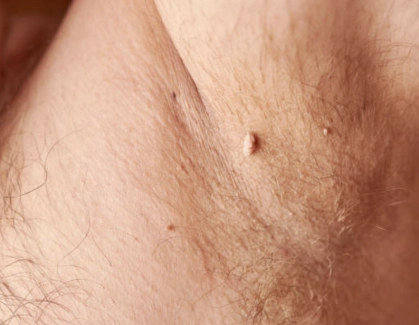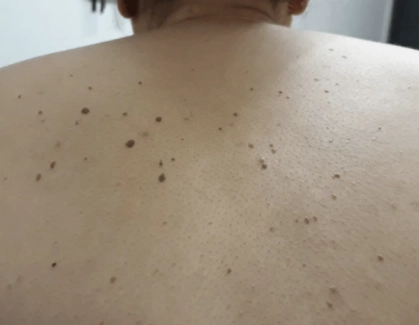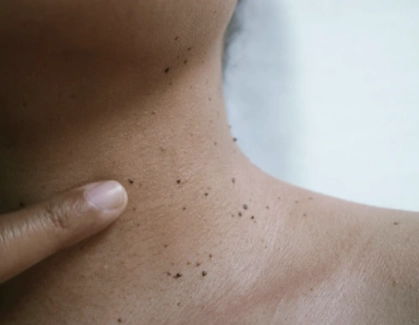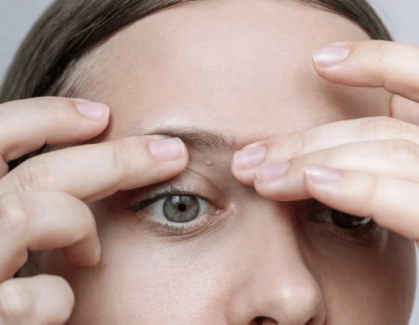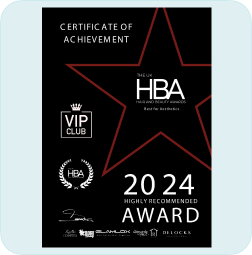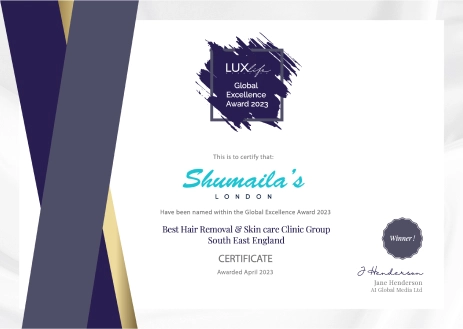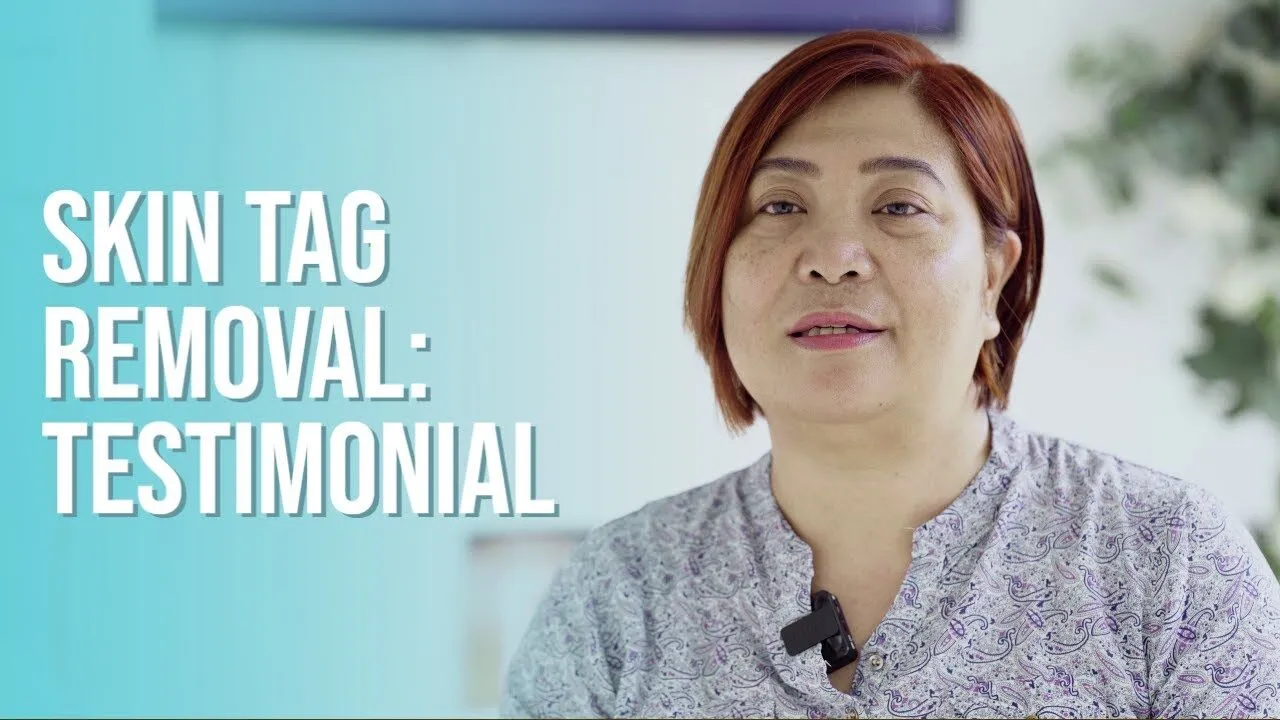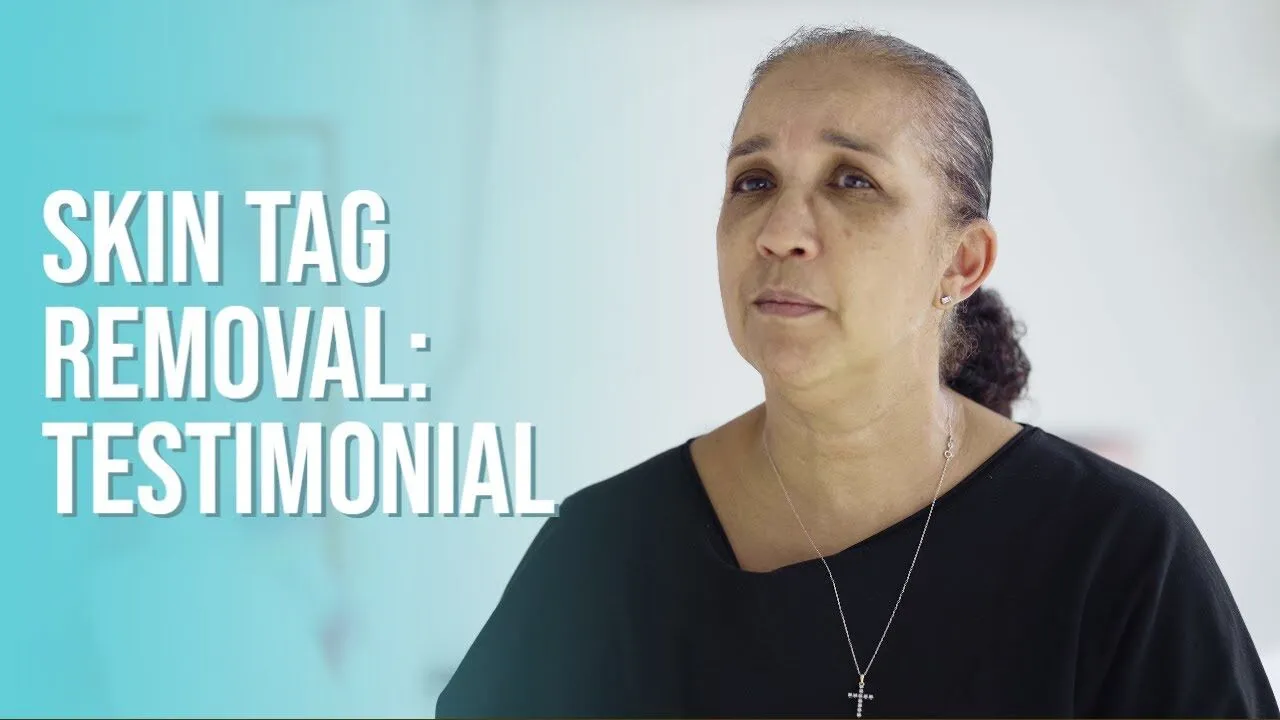Skin Tag Removal provided in both London Branches
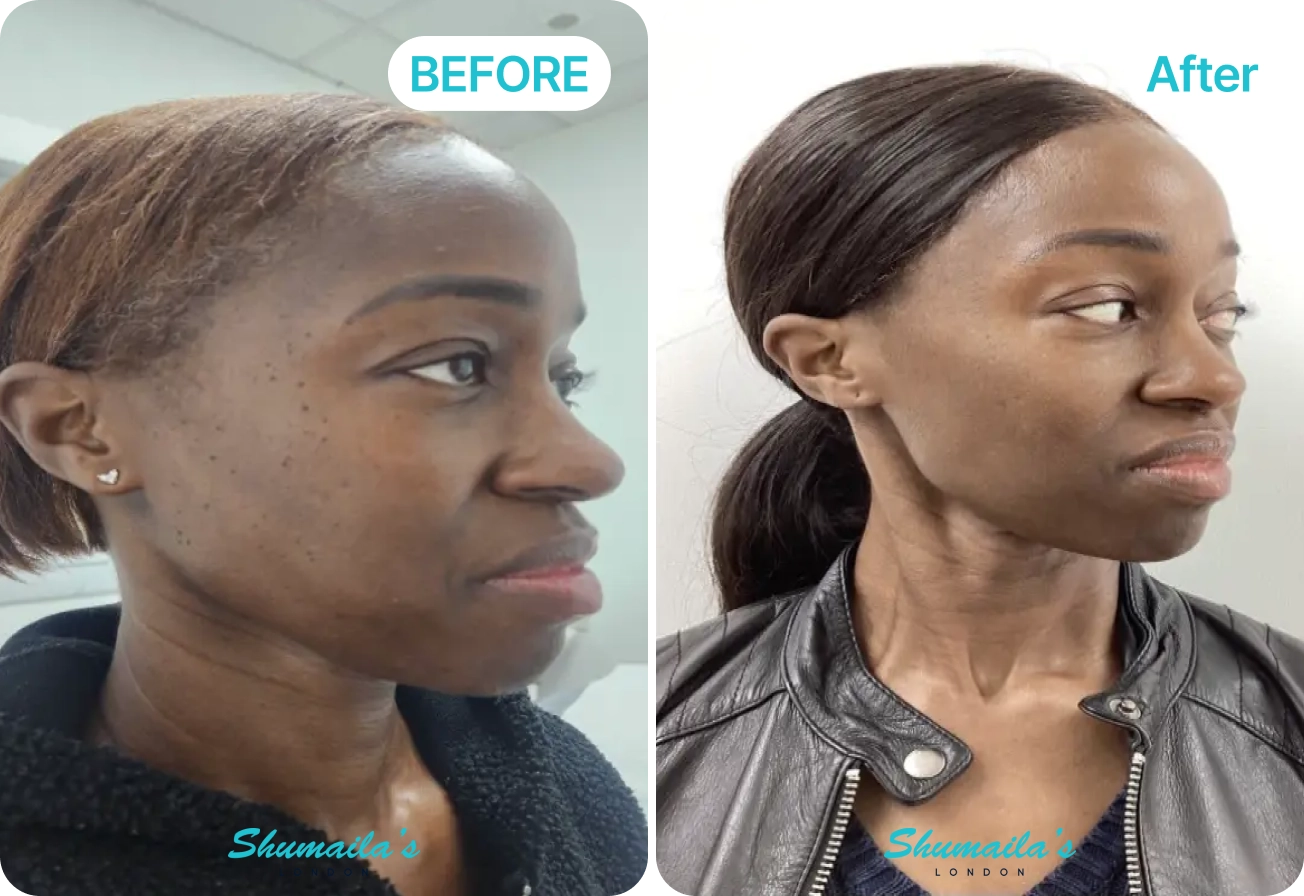
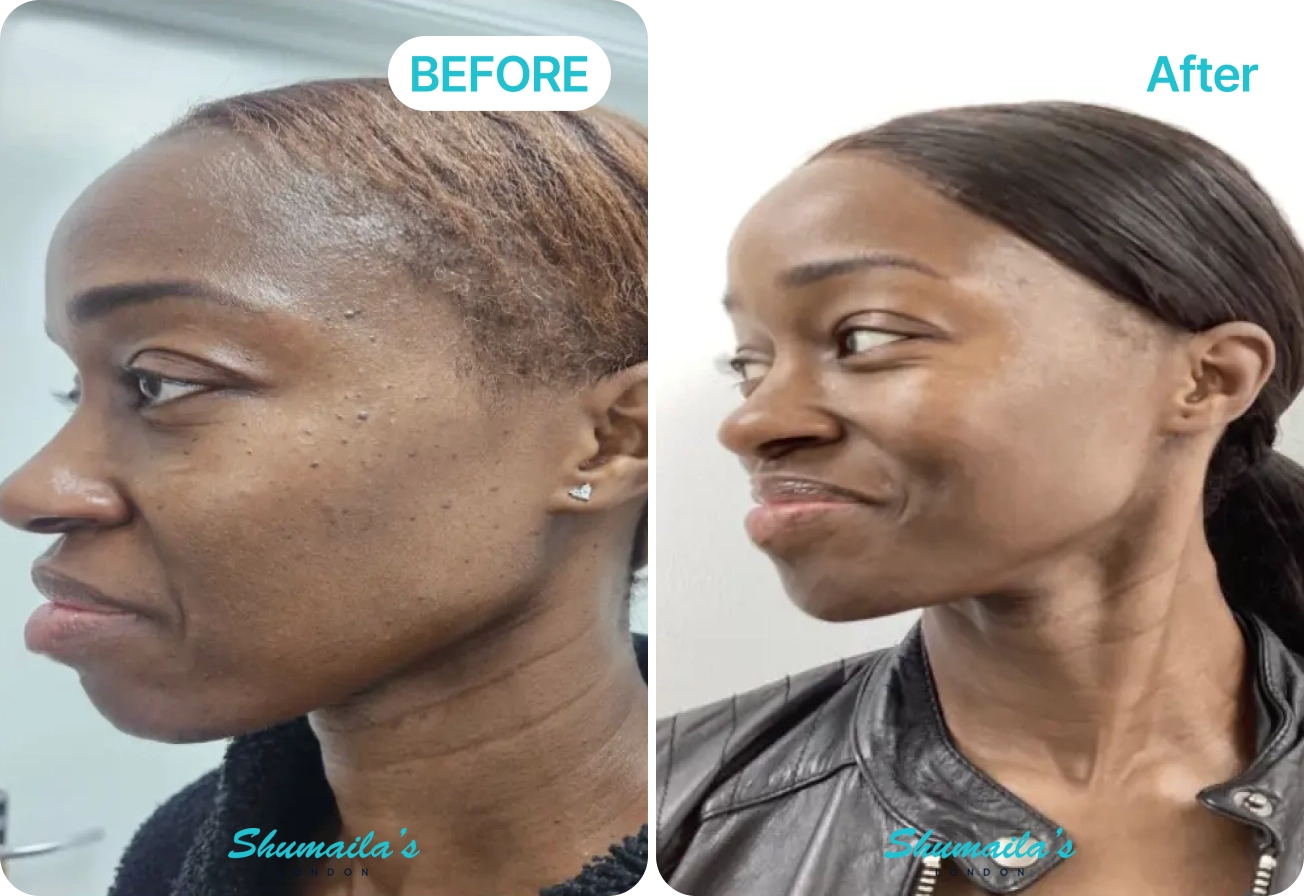
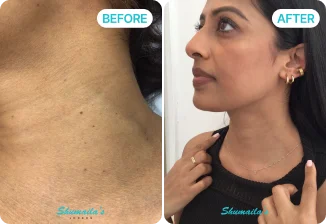
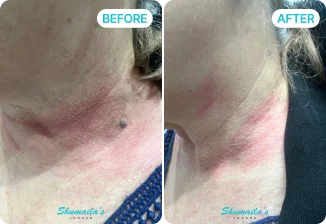
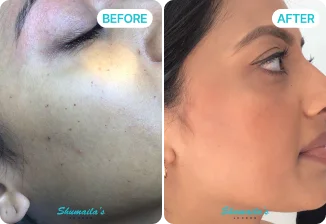
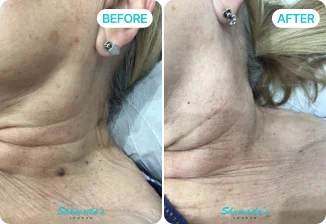
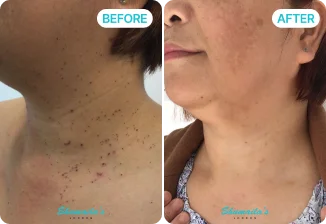
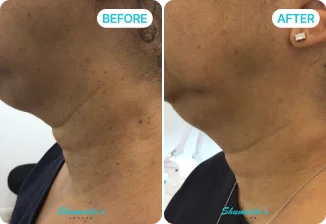
Best Skin Tag Removal in London & Essex

Safe environment with qualified practitioners

Comfortable and effective treatment

Quick Procedure
Skin Tag Removal
How does skin tag removal work?
At Shumaila’s we use advanced electrolysis techniques to safely and effectively cauterise and remove skin tags. A small needle is used to cut off the skin tag and to cauterise it with high frequency current (shortwave diathermy). In fact doctors were using an early type of this treatment back in 1900’s to treat broken capillaries, warts and xanthelasma. The treatment has progressed and improved beyond recognition with modern technology and is a safe, comfortable and effective treatment much in demand by clients.
What are skin tags?
Skin tags are small harmless growths that hang off your skin, they often appear with a stalk like a mushroom and vary in size from smaller than a grain of uncooked rice, to the size of a large pea. They tend to be soft and smooth and can vary in colour.
What causes skin tags?
Skin tags can be caused for no apparent reason, but are usually found in areas of friction where the skin folds rub together for example neck, underarms, groin and eyelid. People who have more folds in their skin are more prone to getting skin tags.
How many sessions will you need?
Depending on how many skin tags you have, our appointment is a maximum of 30 minutes. During this time, we remove as many skin tags as possible. If you only have 1 skin tag, only 1 session is needed – however if you have many then it depends on how many we are able to treat in one 30 minute session. You may need further sessions, to treat them all.
Types of Lesion Removals We Offer
Skin Tags
Skin tags are small, soft, and flesh-colored growths that hang off the skin and are commonly found in areas where the skin folds, such as the neck, armpits, eyelids, and under the breasts. They are typically harmless and not painful but may become irritated by friction or clothing.
Seborrheic Keratosis
Seborrheic keratosis appears as waxy, scaly, or wart-like growths on the skin. They can vary in color from light brown to black and are often seen on the face, chest, back, or shoulders. These lesions are benign and commonly associated with aging.
Dermatosis Papulosa Nigra (DPN)
DPN consists of small, dark, and raised bumps that typically develop on the face and neck, especially in individuals with darker skin tones. These lesions are harmless but may increase in number with age.
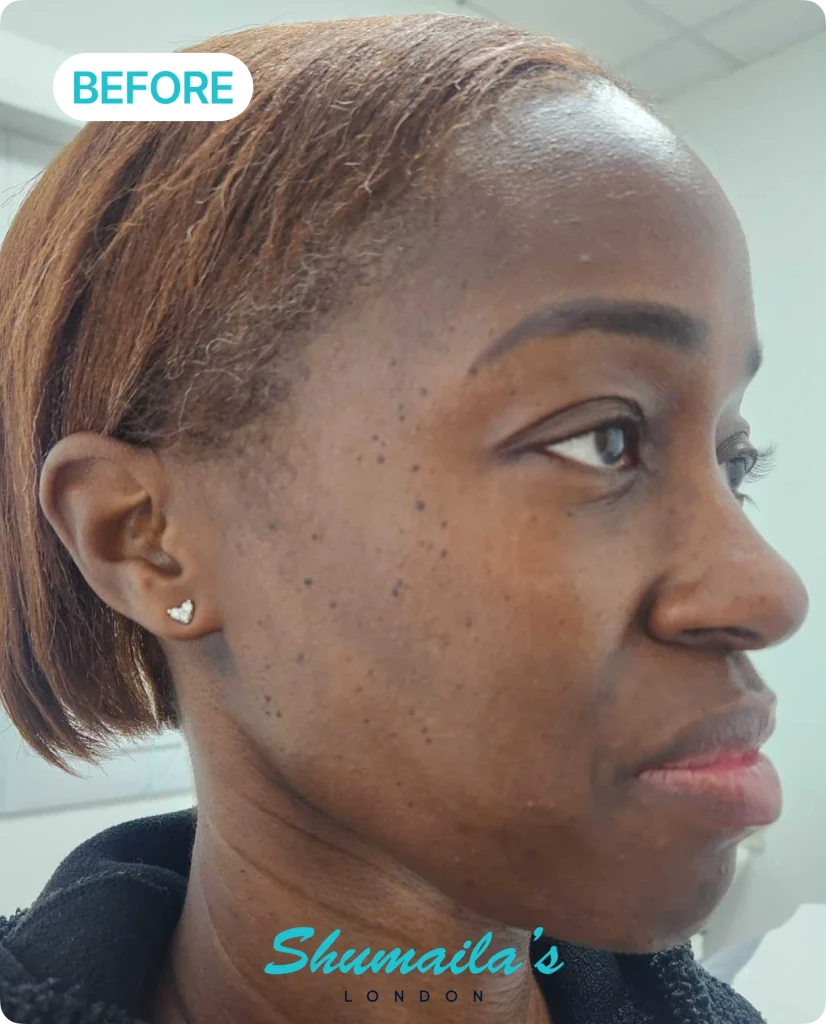
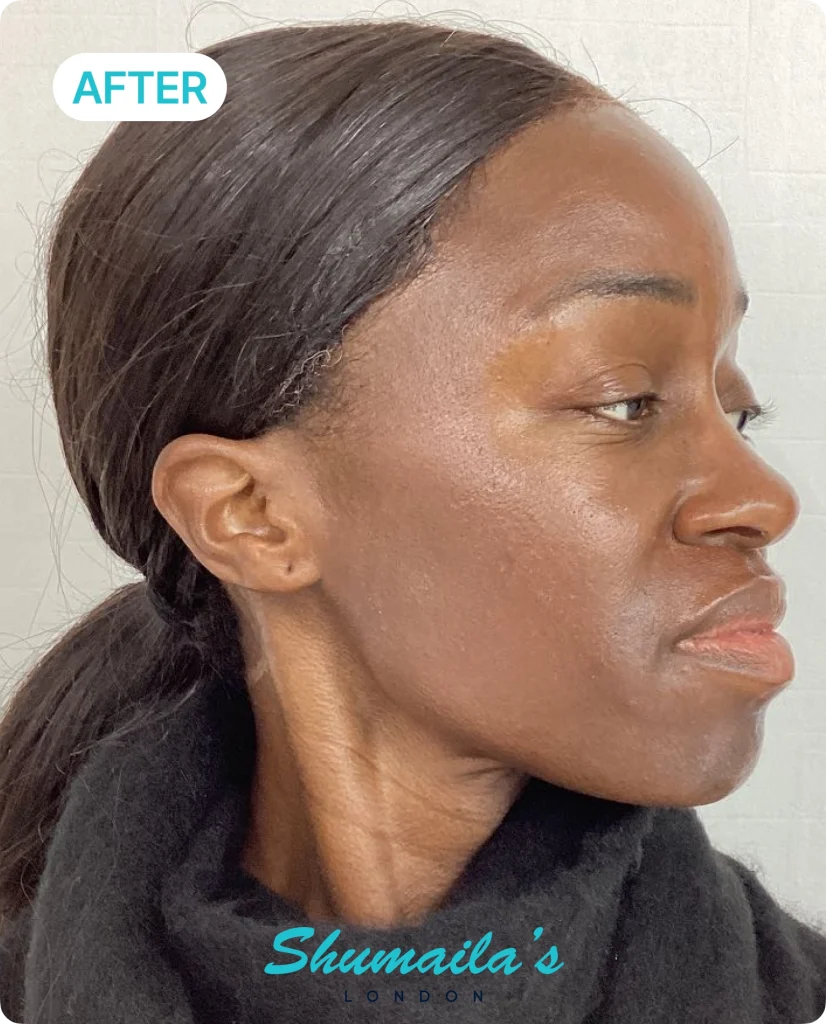
Best Skin Tag Removal in London & Essex
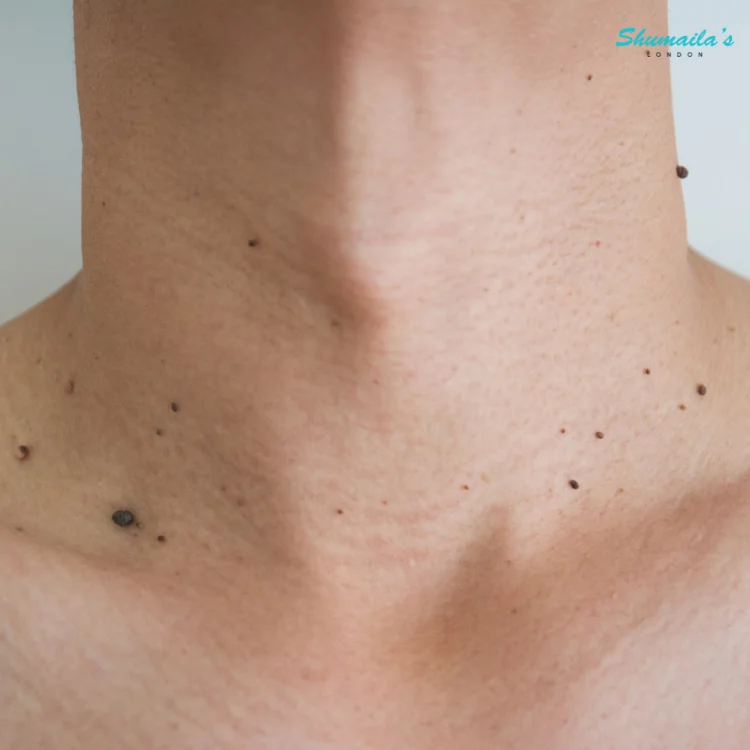
Electrocautery VS Cryotherapy Or Excision
If we compare Excision with Electrocautery, you will be surprised to know that surgery is usually done under local anaesthesia to block any pain. The doctor uses a surgical blade to remove the whole lesion, as well as some normal skin around the edge and then closes the wound using stitches. Whereas the later requires a small needle or prob which means less pain, no anaesthesia with better and permanent results. These methods are affectively used; however, everyone is not comfortable with cuts and razors. These treatment areas can be tailored to suit individual body contouring goals, and multiple areas can often be addressed in a single session. Book your consultation with our qualified practitioner to determine the best treatment plan for your specific needs and desired results. At Shumaila’s we have brought you the safest, the most efficient and effective method: Electrocautery.
Nurun Nehar
9 days agoFew weeks back l booked an appointment for my husband, he had skin tags on his face we wanted that removed, we were booked with Sharn who was very helpful she done the procedure very neatly we were very impressed with the result. We highly recommend this place.Thank you once again Sharn you done a amazing job🩵
Mr. Warraich
13 days agoAmazing work done by shumail’s. I had few tags on skin and they removed it i just few minutes. Staff was very nice, reasonable charges and quick response. Must recommend
Shaloo Haroon
23 days agoVery good job ..i have wart in my eye so they have removed and dr nazia removed it very nicely and gently ...now i have no any wart or any lit dot of wart left...thanks
Sylwester Hawryluk
27 days agoThank you. Outstanding. Highly recommend. Two skin tags were removed with amazing care.
Saritha R
27 days agoGot my skin tags removed by Kinza .Very professional and she actually explained the whole process before starting. Happy with the waxing done by Aasia-Painless and quick work. Recommend this place for all beauty services
Mitch F
44 days agoSkin tag removal: excellent service excellent price. Painless (smallest of stings, even less than an injection). And very quick and the price was by far the best. Would go back in a heartbeat.
sunny khan
44 days agoMarime is a lovely lady at shumailas i come across she treated me twice for unwanted moles on my face and neck and i had great results plz ask for her when you come to shumailas at beehive lane lots of love sunny 😍😍😍
Rachel Green
77 days agoSkin tag removal was very efficient and easy. Ghazala was kind and professional. Thank you!
Saman Durrani
78 days agoI recently had my wart removal treatment at Shumaila’s. The whole process with consultation and treatment was done within 30 minutes. I am quite pleased with the results and I recommend it
Keith Clarke
80 days agoHad a skin tag removed from just under my eye / side of nose. Procedure was quick & mostly painless (slight stinging sensation to be expected with laser treatment). Very professional & friendly. Would use Shumaila’s again, highly recommended.
Laura Reel
87 days agoI chose here to have my skin tag review. Nazia was professional and helpful all the way through. I felt no nerves at ease the whole time. Thank you for a easy experience
Sohail Mahdavian
87 days agoI had skin tag removals under my eyes. Extremely good and well explained process. I would highly recommend using them. I had Ghazala to treating me and she was extremely attentivate.
Florence H
87 days agoI had a thorough consultation with Asma today regarding the removal of skins tags. She answers all my questions and provided really good advice on some other concerns that I had. The procedure was carried out by Mandeep who was very patient (because I'm a bit of a scaredy-cat!). Both Asma and Mandeep were very professional and reassuring. I will definitely return for some other treatment. Thank you!
Jeanette Parker
111 days agoIndu is amazing. I just had my spots removed i am very happy about it. Even with the pain she even makes it effortless, she have the most excellent customer service she always put a smile on my face even with the painful treatments. I feel more confident about my appearance now I didn't even know that this can be removed. Really really happy about this place. I look forward to come here.
John Nightingale
115 days agoAttended Shameilas in Upminster today,for skin tag removal. Rang this Morning and had my appointment at 1pm. Pleasant surroundings and friendly staff. My Therapist, Upmeet was lovely, very informative and calming. I had multiple tags removed including one very large one near my right eye. There was very little discomfort and the whole process was over in under 30 minutes. Would highly recommend Shameilas and Upmeet. 😊❤️ Wendie Nightingale
Mariah
128 days agoVery very pleased with my service today! I had Maria who removed my skin tag. She was friendly, professional and efficient! The overall service from this clinic was amazing. I called them yesterday and was seen the next day. They were fast and efficient with meeting my needs and the receptionist was informative and answered all my questions. I would use this clinic again if needed !
Leanne Francis
128 days agoAs a repeat customer, I came back today for cherry dot removal today and am very happy with the treatment. Staff are very friendly and knowledgeable. Clinic is very clean. Will be back for more in future! Thank you
Janice Summerscales
129 days agoHad afew skins tags removed absolutely brilliant would recommend this place, staff are so friendly, helpful and brilliant
Shy Malik
131 days agoWhat a seamless experience, I first spoke to the wonderful Nazia over the phone who kindly made time to speak to me on a Sunday evening, she explained the skin tag removal procedure to me and it was exactly as expected. Moving on to... The treatment - it was carried out by the lovely Rabia.. OMG SHE IS AMAAAAZING!! Exceptionally thorough and whilst I was apprehensive and thought it would hurt, she was incredibly efficient and I felt minimal pain. While some pain is expected but she kept me calm and the overall procedure didn't take long and I felt at ease throughout. I'd highly recommend Rabia for any treatments and the wonderful Nazia who made me feel so welcomed. Thanks ladies you are spectacular and I would visit you again should I require any of your services.
mehmet dogan
139 days agoshe is real good tag removing not hurt thank you sister 👍
Skin tag removal
Skin tag removal procedure was incredibly quick and Maria was very sweet, made me feel at ease immediately. Slight needling sensation but hardly lasted any time at all and gone in an instant. No sign of the tag at all. Magical. Highly recommended, incredibly easy from start to finish. Also massively more reasonable than nearly everywhere else.
Had a skin tag removal
Had a skin tag removal, was very professional environment with swift service. Would recommend.
Indu is amazing
Indu is amazing. I just had my spots removed i am very happy about it. Even with the pain she even makes it effortless, she have the most excellent customer service she always put a smile on my face even with the painful treatments. I feel more confident about my appearance now I didn't even know that this can be removed. Really really happy about this place. I look forward to come here.
Great experience
Great experience. Very lovely clinic, I had my skin tag removed it was comforting experience.
I just had a skin tag removal done by…
I just had a skin tag removal done by this amazing lady, and I am absolutely impressed! 10/10, definitely highly recommended!
Amazing experience with Indu
Amazing experience with Indu, very quick and professional. Skin Tag removal was quick and painless. Would recommend
I was so pleased with the service at…
I was so pleased with the service at Shumaila’s! I visited to remove a skin tag that had been bothering me for years, and Dr. Shazia made the entire experience smooth and stress-free. She eased me into the process, answered all my questions, and ensured I was comfortable every step of the way. I highly recommend Shumaila’s for anyone considering skin tag removal. Thank you for making my visit so comfortable and straightforward.
Fantastic service
Fantastic service. The booking process online was very easy and they even rescheduled my appointment due to a last minute change in my diary. The clinic is very nice and spotless. The therapist Nadia was great, my skin-tags were removed in a few minutes and with very little pain. Highly recommended! Thank you to everyone at Shumaila’s.
my experience with indu was amazing
my experience with indu was amazing. she was very comforting and I felt relaxed because I was shared at first. but she made sure to talk me through it all. the pain was manageable. as I didn't use any numbing cream. my results are amazing. I heal very well.no scabbing no scaring. she were very professional and I could tell she's knows her job. I already recommended my friends to have their skin tag remove. and anyone else who wants to. worth every penny plus affordable. am a happy customer and I will be back soon. to remove a few from my back. thank you indu. xxxx
Skin tag removal- so worth it!
All the staff were very kind and welcoming, the procedure was explained very well, it was not pain free but well worth it! All my skin tags have been removed!! My lady was very patient with me which was very helpful and made me feel comfortable.
I have a large skin tag on the top of…
I have a large skin tag on the top of my leg. Drs no longer removed them and I had been quoted nearly £500 by Skin Clinics. I saw Shumaila's on Instagram and was quoted £50. Visited today and within a couple of minutes my skin tag is no more. Superb service at the Hammersmith branch. Will definitely be looking at what other services they offer. Thank you Hammersmith branch.
Had a large skin tag removed today…
Had a large skin tag removed today procedure was very straightforward and pain-free staff were lovely and very welcoming
Happy customer at Shumaila’s Loughton.
I have been into Shumaila’s Loughton to have a skin tag removed and milia removed. Both times I had Mittal, she was very friendly and professional and provided a very good service. She even retreated one of the milia that was still slightly there again for free. All of the ladies there are very friendly and helpful and I would recommend their services.
I had done my skin tag with shumaila my…
I had done my skin tag with shumaila my practitioner Rabia she is fantastic very lovely I am very happy 😊 I highly recommended
I came to Shumaila’s London to get my…
I came to Shumaila’s London to get my skin tag removed in Upminster Branch and treated by nazia I am very happy with the service they provide the procedure was very quick and painless highly recommend to anybody looking to get skin tags removed
Skin Tag removal
I was apprehensive due to the location of the skin tag(s) but was put at ease immediately at the Upminster branch. The procedure was explained in full, staff were informative & attentive, with the procedure taking a minimal amount of time with very little pain.
Skin Tags
Today I had an appointment at Shumailas Clinic regarding a large number of underarm skin tags.Apprehensively I listen to how the procedure would unfold and decided to go ahead with it. I needn't have worried because it was quick and totally pain free.Abdul and his team made me feel very comfortable and carried out the procedure with total expertise. I would gladly recommend Shumailas if you have ANY skin issues ,to not hesitate to give them a call.
I have had a truly excellent experience...
I have had a truly excellent experience today at Shumaila's in Cranbrook rd. Mandeep was amazing at providing me with 1st class service. She was very professional and an amazing person and she also reassured me through the process of removing my skin tags. Mandeep also went through the after care service and I was very happy with the results. I would highly recommend Mandeep and I certainly will be going back for different treatments.
Watch A Skin Tag Gone In 30 Seconds
How Are Skin Tags Different From Warts Or Moles?
Skin tags are not the same as warts or moles. There are a few ways to tell the difference: Moles: Unlike skin tags — which tend to be a similar color as the rest of your skin — moles are noticeably pink, tan, or brown. While some moles can be raised, they tend to be flat and round or oval-shaped. In some cases, moles can develop into skin cancer (melanoma). Warts: Like skin tags, warts may be the same color as the rest of the skin. However, they tend to have a rough texture. And unlike skin tags, which have no clear cause, warts are caused by a virus that can be spread from one person to another. (Pennmedicine.org)
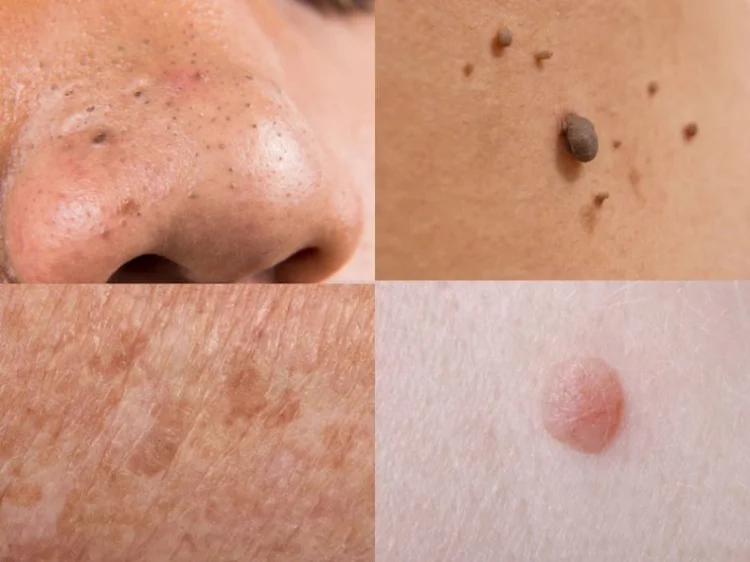
Prices And Offers On Skin Tag Removal
| Skin Tag Removal | Price |
| (1 Tag) | £50 |
| (2 Tags) | £75 |
| (up To 5 Tags) | £100 |
| (up To 15 Tags) | £150 |
| (up To 30 Tags) | £250 |
Get Skin Tag Removal at Shumaila’s, where flawless skin becomes reality. With our expert clinicians, advanced techniques, and personalised care, we deliver safe, minimally invasive procedures that ensure your satisfaction. Experience the convenience, comfort, and confidence of our high-quality services today.
- Expert aestheticians for safe removal
- Advanced techniques for precise results
- Minimally invasive procedures with minimal downtime
- Personalized care tailored to your needs
- High-quality service and exceptional client satisfaction
How To Get Started?
- Step 01 Book your FREE phone consultation by requesting a call back. During this we will:
- address any questions that you might have regarding the treatment.
- go through aftercare.
- discuss the area that needs to be treated
- go through prices
- invite you to come to the clinic so we can assess your skin tag that needs removing, and remove it same day if it is a skin tag
- Step 02 If you are happy with all of the information, you can then book an appointment to start your laser hair removal treatment with one of our highly qualified laser therapists.
Frequent Asked Questions
POST TREATMENT ADVICE TO CLIENTS Following your treatment you may experience:
- Reddening, swelling and sensitivity of the skin in the area up to 48 hours.
- The treated area and surrounding skin may feel hot for up to 48 hours.
- Pin dot crusts or small scabs may appear in the treated area.
- The skin may itch as the healing process takes place.
Following treatment ensure that you adhere to the aftercare instructions to avoid unwanted reactions/infections:
- Apply an antiseptic cream where the skin tag is removed to protect the skin from infections
- Pin dot crusts or scabs may appear which seal the skin and prevent infection.
- These must not be rubbed or picked off, as to do so may result in scarring.
- The crusts or scabs are tiny and often are “felt” rather than “seen”.
- Do not touch, rub or irritate the treated area.
- When washing and cleansing around the area, use a gentle soap or perfume free cleanser and gently pat the area dry to avoid dislodging any crusts or scabs.
- Avoid activities for 48 hours that stimulate blood flow following vascular treatments, e.g exercise, hot showers, hot baths, hot spicy food and alcohol.
- Avoid activities for 48 hours that may irritate or dislodge any crusts or scabs, e.g. swimming, saunas, steam rooms, facial steaming, facial scrubs, waxing and other beauty treatments until the area has completely healed.
- You must keep out of UV light completely during the healing process and as much as possible hereafter.
- Once healed, cover and protect sun exposed areas using a good quality, high factor sunscreen at all times, particularly in the summer months.
- Avoid using any possible skin sensitisers or irritants such as perfumes, fake tan, products or perfumed body lotions until skin is healed.
- Should you have any concerns regarding your treatment please contact the salon.
The treated skin tag should not return, however others may occur depending on the root cause.
Following your treatment you may experience:
- Reddening, swelling and sensitivity of the skin in the area up to 48 hours.
- The treated area and surrounding skin may feel hot for up to 48 hours.
- Pin dot crusts or small scabs may appear in the treated area.
- The skin may itch as the healing process takes place.
There is a risk of pigmentation changes to the skin where the skin tag is removed. For very small skin tags, the risk is very small however for larger skin tags the skin where the tag is removed may be lighter or darker when healed.
We recommend applying an antiseptic cream such as savlon where the skin tag is removed to protect the skin from infections.
We are not able to offer skin tag removal if you have one of the following conditions: You are pregnant You have Cancer or history of cancer You have Epilepsy You have Diabetes Type 1 You suffer from Keloid scarring You have Lupus, AIDS, HIV, Hepatitis You have metal pins or plates in area of treatment You have a pace maker You have an auditory device You have Thrombosis or Phlebitis You have Haemophilia You have an Infectious diseases You have circulatory disorders
One of our friendly consultants will contact you to answer your questions, and to book a consultation for your chosen treatment.
